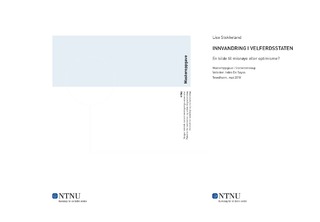| dc.description.abstract | Immigration has been a highly debated topic for a long time. This study investigates the relationship between the proportion of the immigrant population and attitudes towards the welfare state. It also examines if a higher share of immigrant population leads to lower country-level conditions of the welfare state. Previous research has shown glaring results regarding this topic. This study finds no significant connection between the proportion of the immigrant population and attitudes towards the welfare state. The effect of the immigrant share on these attitudes are modest. Further, I found that people who have negative attitudes towards immigration have no substantial economic reason to fear immigration, and that these respondents are no less likely to support welfare states. This study is based on two different types of analyzes: a multilevel analysis and a Times-Series Cross-Section analysis. The former is developed on the basis of 33552 and 35153 respondents which is nested within 19 European countries. The individual data is gathered from the European Social Survey from 2014 and the variables on country level is obtained from the World Bank. The Time-Series Cross-Section analysis runs from 1992-2016 and is based on 33 countries and 700-759 respondents. These data are gathered from the World Bank, the Varieties of Democracy Project (V-Dem) and the Organization for Economic Cooperation and Development (OECD). | nb_NO |
